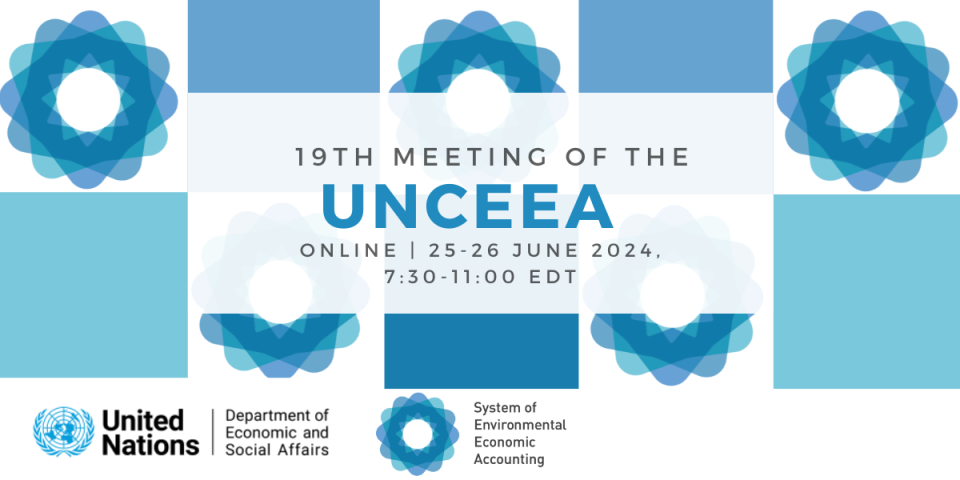19th Meeting of the UN Committee of Experts on Environmental-Economic Accounting

The 19th Meeting of the UN Committee of Experts on Environmental-Economic Accounting (UNCEEA) took place online on 25-26 June 2024. Members of the UNCEEA from about 30 countries and several international organizations (e.g. Eurostat, FAO, OECD, UN Tourism, IMF and UN Regional Commissions) discussed progress on its work programme and future plans.
The Director of UNSD, Stefan Schweinfest, opened the meeting by highlighting the achievements of the UNCEEA since its establishment by the UN Statistical Commission in 2005 and the relevance of its work to advance the conceptual and practical implementation of environmental economic accounting for policy and decision making. In addition, the Chair of the UNCEEA and Chief Statistician of Canada, Andre Loranger, welcomed participants to the meeting, reflecting on the progress of the Committee over the past year and the tasks ahead, such as the update of the SEEA Central Framework.
One of the main topics of the meeting was an update of the Committee’s Terms of Reference, which was endorsed by the UN Statistical Commission in 2006. The Committee endorsed an updated Mandate and Governance document which reflects the past achievements of the Committee and its current priorities and functioning. The new proposed Mandate and Governance will be submitted to the 56th Session of the UN Statistical Commission in 2025 for approval.
Another main focus of the meeting was the update of the international statistical standard, the SEEA Central Framework. The UN Statistical Commission endorsed the proposal for an update of the SEEA Central Framework at its 55th Meeting in March 2024, citing the need for the SEEA Central Framework to remained aligned, as appropriate, with the 2025 System of National Accounts and responsive to emerging policy demands, such as those related to climate change, biodiversity and circular economy. The Technical Committee on the SEEA Central Framework will be leading the update and will soon hold a global consultation on the list of issues for the update.
The UNCEEA also discussed the work of the Technical Committee on the SEEA Ecosystem Accounting, including the progress it has made to develop metadata for two headline indicators of the monitoring framework of the Kunming-Montreal Global Biodiversity Framework which use the SEEA Ecosystem Accounting as a methodological basis. In addition, the UNCEEA also discussed the workplans of the Technical Committee’s two working groups on forest ecosystems and ocean accounts, as well as the Technical Committee’s plans to develop compilation guidelines for the SEEA Ecosystem Accounting.
With regards to global databases, the Committee welcomed the progress made by the Working Group on the Development of Global Databases in advancing data collection and dissemination for air emission, physical energy flow and material flow accounts. The Working Group is currently conducting feasibility studies on land cover and physical water flow accounts, which it will present to the Committee at its 2025 meeting. In addition, the Committee received an update on the Third Phase of the G20 Data Gaps Initiative (DGI-3), which the Working Group, along with the Technical Committee on the SEEA Central Framework, is closely involved in.
Finally, the Committee discussed the plans of the Working Group on Implementation and Statistical Capacity Building. The group plans to revitalize the SEEA Focal Point network, in order to strengthen capacity building activities globally. The Working Group also plans to add additional members from international organizations, regional development banks and countries. In addition, the Working Group will conduct the annual Global Assessment on Environmental-Economic Accounting and Supporting Statistics later this year, which will provide an up-to-date number on the number of countries compiling the SEEA.
The meeting documents can be found here: https://seea.un.org/events/19th-meeting-un-committee-experts-environmental-economic-accounting.
